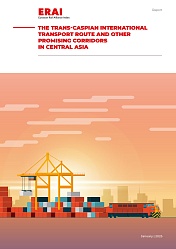Kazakhstan is the middle country no matter what route you take. On the traditional northern route it is the link between China and Belarus, but also on the Middle Corridor, it is the country to pass to reach the Caspian Sea. Cargo that cannot transit Russia chooses this passage, and the route is becoming increasingly popular.
Concern for sanctions
However, there are concerns that Kazakhstan is put on the sanction list too. This results from a discussion in the UK Parliament on 28 February. Member of Parliament Margareth Hodge raised the question whether ‘jurisdictions like Kazakhstan and Azerbaijan should also be subject to sanctions considering they are also complicit and supporting Putin in his endeavors’.
The Foreign Minister Liz Truss responded that she would look into that possibility, as the UK is also imposing Belarus for its support of Russia.
In the same union
Norlan Bagibayev, a logistics and supply chain professional in Kazakhstan calls it a «high potential sanction risk for Kazakhstan and Azerbaijan. «Unprecedented sanctions on Russia taught us that international logistics is always a part of geopolitics», he wrote on Linkedin. «Keep in mind that Kazakhstan is in the same economic and military union with Russia.»
The discussion has caught the attention of country officials too. In an interview with Euractiv, Timur Suleimenov, the first deputy chief of staff to the president of Kazakhstan emphasised his willingness to remain open for trade with all nations.
«Even though we are part of the Economic Union with Russia, Belarus and other countries, we are also part of the international community. Therefore the last thing we want is secondary sanctions of the US and the EU to be applied to Kazakhstan.»
"Yes, we will continue trading with Russia. We will continue to invest in Russia and attract investment for Russia: there is no way for our economy to do it differently. But we will do our best to control the sanctioned goods. We will do our best to control any investment from a sanctioned person or entity in Kazakhstan, and this is something we wanted to convey to Europeans openly", the official said.
Search for other routes
Although these statements were made at the end of March, it has not consoled Bagibayev. He regularly ‘warns’ his counterparts around the world to take these risks in consideration, not in the last place because capacity on the route is limited anyways. «The throughput still has free capacity, but in a couple of months it will be totally exhausted.
«I highly recommend use alternative routes for some part of your freight through Uzbekistan, Turkmenistan and Iran for good risk management», he said last week. «Better to store eggs in different baskets nowadays.»





